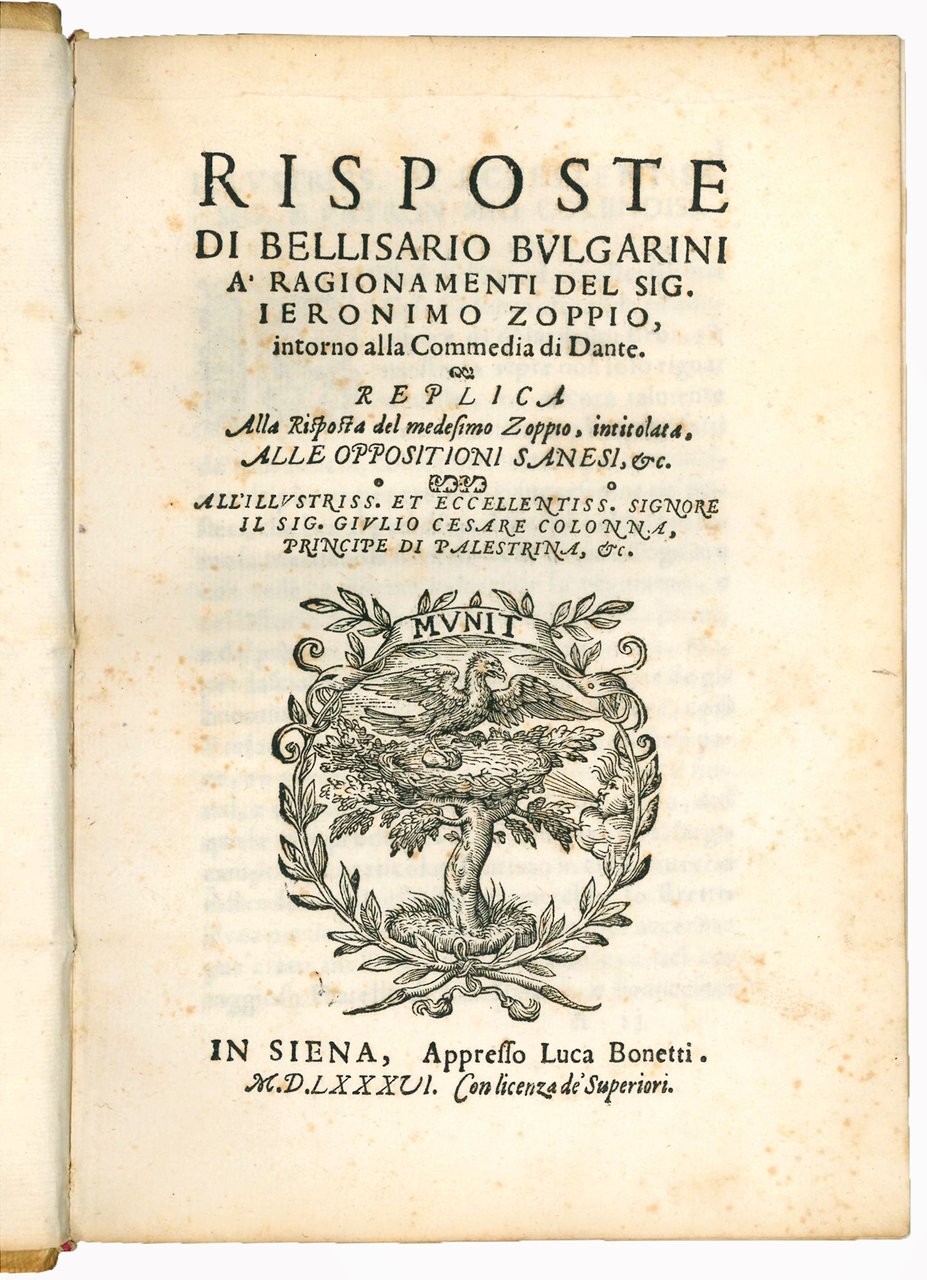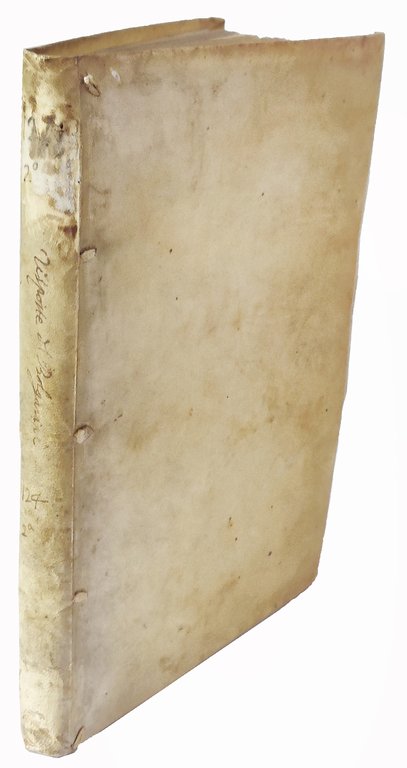Risposte di Bellisario Bulgarini a' Ragionamenti del Sig. Ieronimo Zoppio, intorno alla Commedia di Dante. Replica alla risposta del medesimo Zoppio, intitolata, alle opposizioni sanesi, &c. [...]
Risposte di Bellisario Bulgarini a' Ragionamenti del Sig. Ieronimo Zoppio, intorno alla Commedia di Dante. Replica alla risposta del medesimo Zoppio, intitolata, alle opposizioni sanesi, &c. [...]
Mode de Paiement
- PayPal
- Carte bancaire
- Virement bancaire
- Pubblica amministrazione
- Carta del Docente
Détails
- Année
- 1586
- Lieu d'édition
- Siena
- Auteur
- BULGARINI, Bellisario (1539-1620)
- Éditeurs
- Luca Bonetti
- Thème
- Quattro-Cinquecento
- Etat de conservation
- En bonne condition
- Langues
- Italien
- Reliure
- Couverture rigide
- Condition
- Ancien
Description
THE QUARREL OVER DANTE
4to (220x151 mm). 237, [3] pp. Collation: A-Gg4. The Replica del medesimo Bellisario Bulgarini, alla risposta del predetto sig. Ieronimo Zoppio, intitolata, alle opposizioni sanesi begins with a separate title page on l. Bb3v. Printer's devices on both title pages and at the end. Contemporary limp vellum with overlapping edges, inked title along the spine (traces of ties). Some occasional foxing and browing, a few marginal stains, small round worm hole to the blank margin of a few leaves at the end of the volume not affecting the text, overall a very good, fresh, and extremely genuine copy.
First edition, dedicated to Giulio Cesare Colonna, of this book that Bulgarini published in response to Girolamo Zoppio (1516-1591) as part of the so-called quarrel over Dante, that opposed him not only to Zoppio, but also to Jacopo Mazzoni (1548-1598), Orazio Capponi (1552-1622), and Alessandro Cariero (fl. 2nd half of the 16th cent.).
“It will be remembered that in 1583 Girolamo Zoppio had published two ragionamenti in Dante's defence. Apparetly Bulgarini or one of his fellow Sienese answered these essays, for in 1585 Zoppio replied with a Risposta alle oppositioni sanesi fatte a' suoi ragionamenti in difesa di Dante; but I have found no trace of the intervening documents. As for Zoppio's Riposta, its materials are essentially irrelevant to the real problems of the quarrel, concerning as they do Zoppio's practice in the writing and the spelling of Italian. Inevitably, Bulgarini in his turn replied to both these works in a book whose long double title indicates its double reference: Risposte a' Ragionamenti del Sig. Ieronimo Zoppio, intorno alla Commedia di Dante; Replica alla risposta del predetto sig. Ieronimo Zoppio, intitolata, alle opposizioni sanesi, &c. (1586). About Bulgarini's basic position there can again be no doubt, fo he states his thesis, clearly in the ‘Proemio': ‘…that Dante in his work of the Commedia cannot readily be defended by means of the precepts and the teachings given to us by Aristotle in his Poetics'. Once again, he follows the order of Mazzoni's Difesa in presenting his arguments. But Aristotle is his authority, ‘for Aristotle … has acquired such credibility with everybody that his opinions are believed to be, so to speak, irrefragable'. There is perhaps little in this document that Bulgarini had not said before, although the tone is now more extreme and rabid. In connection with Mazzoni's first ‘particella', he re-examines the materials and the audience of poetry, leaning heavily upon Aristotle but also seeking verification in Giovanni Battista Pigna […] On this basis, Bulgarini again condemns Dante's use of scientific materials. Essentially, these are undesirable in themselves as the objects of poetry because they are true, not feigned; this means that they can never meet the requirements of necessity and verisimilitude. Of the two possible ways of treating philosophical arguments -the verisimilar imitation of actions attributed to a philosopher, or the disputation over technical matters- Dante has chosen the latter, which is not in any sense poetic. Returning, in his remarks on the fifth ‘particella', to the classification of the Divina Commedia, Bulgarini finds that it is a mixture of several genres: it is not comic in persons or materials or manner, although its language is frequently low; it is tragic in its effect -the sufferings of the damned move to pity- but it has a happy ending; the special grace accorded to Dante makes of him a heroic person, and in general the personages of the Paradiso are of epic stature; besides, the verse form (the terza rima) is proper to the epic. Considering these qualities, Bulgarini decides that the poem does not fit completely into any one of the classes and that the only genre in which it might be placed -if it is a poem at all!- would be that of satire, ‘because of the defamation' (‘per conto della maladicenza', p. 82)” (B. Weinberg, A Histor


